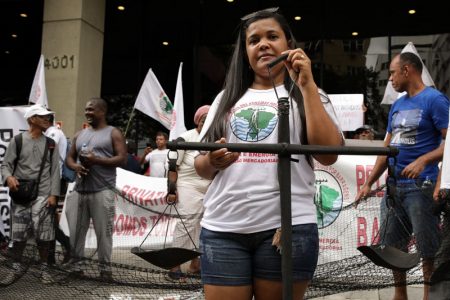Lead, mercury, cadmium and zinc are just some of the heavy metals found in the toxic mud left over from mining activities. Government officials in Minas Gerais, Brazil, identified levels of these metals up to 21 times above the acceptable metal in the mud that spread through Brumadinho and the Paraopeba River on 25 January, 2019.
Geraldo Martins, a healthcare volunteer who heads up the provision of medical attention for peoples affected by the Brumadinho landslide in the municipality of Pompeu, told Real World Radio how the Brazilian Movement of People Affected by Dams [1] (MAB) is handling treatment.
“We listen, guide and support people. That is our role,” said Martins. In cases such as Brumadinho [2], this comprehensive approach to healthcare involves treatment of both physical and psychological ailments: skin allergies due to contact with toxic mud, asthma, rhinitis and other breathing problems caused by dust, but also depression and cognitive issues arising from the impacts of polluted water on the central nervous system.
MAB denounces that just like what happened in Mariana [3] “companies do not want to admit that the collapse of dams causes health problems, because they know how much more complex and expensive it is to repair those.”
“We must raise awareness about the health problems, and measure and repair them in a comprehensive way,” said MAB.
In cases like this, depression is caused by the shock of losing loved ones, relatives, friends and coworkers, and due to the changes in way of life: “It’s the feeling that the world is over,” said Martins.
The lives of thousands of people depended on the Paraopeba river banks, the Tres Marías reservoir and the San Francisco river – catching fish, growing their own food, selling local products (such as cheese and milk), as well as swimming and enjoy time with family and friends.
“My relatives don’t come to visit anymore, and tourists no longer come to my farm,” said a Pompeu farmer.
For women, the impacts are many: their husbands who worked as miners probably lost their jobs or were transferred; or women may have been left widowed, now alone in taking care of the home. In any case, it is difficult for them to start working in formal jobs, since most used to fish and sell artisanal products for a living. The market for this has been lost completely this past year.
Eliana Marques, aged 50 years old, was an artisanal fisherwoman from Cachoeira do Chorro, near the Tres Marías hydroelectric dam. She received the initial emergency aid secured by MAB for 108,000 people, but suddenly stopped receiving the money last September. In an interview with Real World Radio, she reported that the Vale company forced several people to sign extrajudicial agreements, and criticized the lack of official warnings about the state of river pollution.
“This has greatly affected my family and the community,” said Eliana. One of her daughters, who used to work as a fisherwoman, had to move 200 kilometres away with her husband to look for a job, leaving her daughter with Eliana. She still hasn’t found a new job.
Erliete Rocha de Campos lives at the PA Queima Foco Settlement. She produces milk and cheese and raises chickens. She now suffers from depression, not only due to the economic impacts of decreased sales, but also for no longer being able to enjoy a walk by the Paraopeba.
“People lost so many things. The water in the river is brown, sometimes you find dead fish. There is so much sadness. I’m hopeful that one day I will see the river I used to know, that I will be able to swim, fish, play with my children there. But right now, our daily life is very difficult.”
Another health issue among women is an increase in miscarriages. In Mariana (following the dam disaster caused by Samarco mining company on the Doce River in 2015, which serves MAB as a model for how to manage healthcare in Brumadinho), Geraldo Martins said that the number of miscarriages has substantially increased. In Brumadinho, the same is starting to happen.
“The nicest part of our job is when people recover their dignity and let the grief become a struggle for human rights,” said Geraldo, on his way to the MAB Health Office established in a Pompeu gym, where hundreds of people participating in the march [4] are resting before resuming their journey towards Brumadinho.
